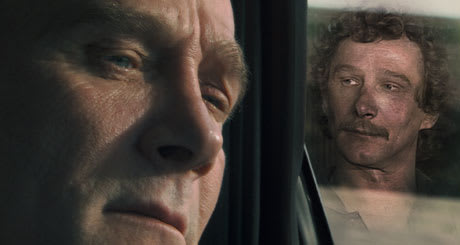In the press notes, My Greatest Escape is described as uplifting, as a liberation of the mind and soul, which is probably the appropriate, socially conscious interpretation to have for those that are particularly solipsistic, but it's also a load of crap. While, indeed, escaped French convict Michel Vaujour proselytized to please the status quo, it's not as if his "soul" transformed or that he was particularly jazzed about it; he just gave up fighting.
The big internal revelation, as communicated in the documentary, shares kinship more with the notion that wasting your life on "issues" is meaningless, as it ultimately means nothing and we all die alone anyways. Hilary Clinton would not approve.
Told in first person, with the occasional insert of old family photos and "lone highway" footage, in case we missed that it was about the journey — thanks, Jack Kerouac — My Greatest Escape chronicles the many infamous escapes of 27-year-long prisoner Michel Vaujour, along with his rationalizations, ideological stance and relationship with his family.
Most should find his accounts of escaping from courtrooms with makeshift guns and making getaways in rooftop helicopters piloted by his wife fascinating, while the social anthropologist crowd should find Vaujour's defiance of social expectations and initial attempts to make light of arbitrary rules particularly magnetic.
Vaujour's problem was not necessarily that he looked at the world and thought that everyone in it was ridiculous but more that he felt compelled to interfere with those trying to mind their own business, via car theft and bank hold-ups. He probably should have painted self-portraits or developed an addiction to porn instead.
Initially intriguing, the documentary runs about a half-hour too long, growing ever-wearisome, especially when the ex-con tries to blame his behaviour on never having a brother. In addition, as most of the doc is filmed in close-ups, nose-hair becomes distracting and increasingly nauseating.
(Celluloid Dreams)The big internal revelation, as communicated in the documentary, shares kinship more with the notion that wasting your life on "issues" is meaningless, as it ultimately means nothing and we all die alone anyways. Hilary Clinton would not approve.
Told in first person, with the occasional insert of old family photos and "lone highway" footage, in case we missed that it was about the journey — thanks, Jack Kerouac — My Greatest Escape chronicles the many infamous escapes of 27-year-long prisoner Michel Vaujour, along with his rationalizations, ideological stance and relationship with his family.
Most should find his accounts of escaping from courtrooms with makeshift guns and making getaways in rooftop helicopters piloted by his wife fascinating, while the social anthropologist crowd should find Vaujour's defiance of social expectations and initial attempts to make light of arbitrary rules particularly magnetic.
Vaujour's problem was not necessarily that he looked at the world and thought that everyone in it was ridiculous but more that he felt compelled to interfere with those trying to mind their own business, via car theft and bank hold-ups. He probably should have painted self-portraits or developed an addiction to porn instead.
Initially intriguing, the documentary runs about a half-hour too long, growing ever-wearisome, especially when the ex-con tries to blame his behaviour on never having a brother. In addition, as most of the doc is filmed in close-ups, nose-hair becomes distracting and increasingly nauseating.
